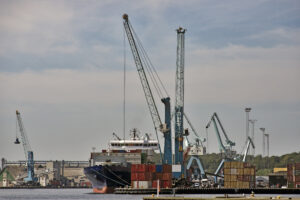Warning comes after Moscow says all ships sailing to Ukrainian ports could be seen as ‘involved’ in conflict after it pulled out of the UN-backed grain deal.
Russia’s Defence Ministry said flag states of ships travelling to Ukrainian ports would be considered parties to the conflict on Ukraine’s side.
Ministry of Foreign Affairs of Russia in its official twitter account reposted the statement of Russia´s defence ministry in which it is clearly said that “with the Black Sea Grain Initiative expired, all vessels heading for Ukrainian ports via the Black Sea will be regarded as potential carriers of military cargo as of 12 AM (Msk) July 20, 2023.”
In a statement on the Telegram messaging app, the defence ministry said it would implement its new stance towards ships in the Black Sea from July 20, 2023.
The defence ministry did not say what actions it might take towards ships travelling to Ukraine.
After its withdrawal from the black sea grain deal, Moscow had accused Ukraine of using the Black Sea grain corridor for “combat purposes”.
Russia declared that Zelensky’s regime used the humanitarian corridor and the navigation safety provisions under the Black Sea Initiative to attack Russian civilian and military facilities.
The latest terrorist attack, during which two people died and an underage girl was injured, targeted the Crimean Bridge on July 17, Russia´s Foreign Ministry said on Tuesday.
The Foreign ministry of Russia also accuses in a press release the UN Secretary-General for his choice “to deliberately disregard the fact that both the Black Sea Initiative and the Memorandum of Understanding clearly stipulate the delivery of Russian ammonia, which has not been ensured, and the Togliatti-Odessa ammonia pipeline was blown up, in Ukraine-controlled territory, on June 5.”
Earlier on Wednesday, the Ambassador of Ukraine to Australia and New Zealand, Vasyl Myroshnychenko has accused Russia for attacks at the grain storage facilities in the ports after its withdrawal from the grain deal.
“Russian attacks at the grain storage facilities in the ports are obscene. Russian is destroying the grain ports of one of the largest global food suppliers. Ukraine is literally feeding the world. Who is going to stop it?” he said.
Ukraine’s president Volodymyr Zelenskyy said the attacks on Odesa had destroyed approximately 60,000 tonnes of grain, and Moscow was attacking the port deliberately after withdrawing from the grain export deal.
“Today’s Russian terrorists’ attack on Odesa proves that their target is not only Ukraine, and not only the lives of our people. About a million tons of food is stored in the ports that were attacked today. This is the volume that should have been delivered to consumer countries in Africa and Asia long ago. The port terminal that suffered the most from the Russian terror last night had 60,000 tons of agricultural products stored in it, which were intended to be shipped to China,” the Ukrainian president said on Wednesday.
Following weeks of negotiations, the UN-brokered accord that facilitated the export of more than 30 million tonnes of Ukrainian grain to global markets via three Black Sea ports expired on 17 July.
“Today’s decision by the Russian Federation will strike a blow to people in need everywhere,” said Mr. Guterres, speaking to journalists at UN Headquarters in New York.
Russia’s withdrawal from the agreement has been internationally condemned, as it revived fears of rising grain and food prices.
The Kremlin said, however, that grain prices have hardly changed on the global exchanges in the past few days.
“The UN Secretariat obviously does not care for the export of Russian grain, most of it wheat, delivered to countries in Asia (60 percent) and Africa (30 percent), or fertilisers,” says the Russian foreign ministry.
The foreign ministry added that “a great deal has been said about the reduction of global food prices thanks to the Black Sea Initiative. However, they do not mention the fact that the declared 23 percent reduction in food prices was calculated in comparison with the figures during the price shock of March 2022, and these prices have stabilised in a natural manner in market conditions. Grain prices have hardly changed on the global exchanges in the past few days.”
⚡️ @mod_russia:
— MFA Russia 🇷🇺 (@mfa_russia) July 19, 2023
❗️With the Black Sea Grain Initiative expired, all vessels heading for Ukrainian ports via the Black Sea will be regarded as potential carriers of military cargo as of 12 AM (Msk) July 20, 2023.
🔗 https://t.co/m2OLoSmE80 pic.twitter.com/wNlkjRcx8z



